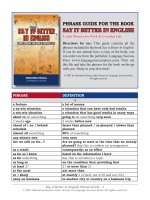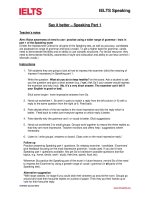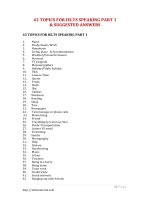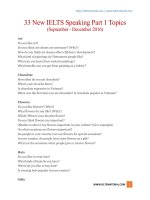Speaking part 1 say it better 0
Bạn đang xem bản rút gọn của tài liệu. Xem và tải ngay bản đầy đủ của tài liệu tại đây (42.08 KB, 4 trang )
IELTS Speaking
Say it better – Speaking Part 1
Teacher’s notes
Aim: Raise awareness of need to use / practise using a wider range of grammar / lexis in
part 1 of the Speaking exam
(Under the Assessment Criteria for all parts of the Speaking test, as well as accuracy, candidates
are assessed on range of grammar and lexis (vocab). To get a higher band for grammar, cands
need to demonstrate flexibility and an ability to use complex structures. For lexical resource, they
need to demonstrate flexibility, awareness of style and collocation and ability to use less common /
idiomatic vocab.)
Instructions
1. Tell students they are going to look at how to impress the examiner (elicit the meaning of
impress if necessary) in Speaking part 1.
Write the question: What do you do to keep healthy? on the board. Ask a student to ask
you the question and give a short answer (e.g. I run.) Ask Ss if your answer would impress
the examiner and why (not). (No. It’s a very short answer. The examiner can’t tell if
your English is good or bad).
Elicit some longer / more impressive answers from Ss.
2. Hand out worksheet 1. Ss work in pairs to match a reply from the left column (1-6) with a
reply to the same question from the right (a-f). Feed back.
3. Pairs decide which of the two replies is the most impressive and tick the reply which is
better. Feed back to make sure everyone agrees on which reply is better.
4. Pairs identify why the grammar and / or vocab is better. Elicit suggestions.
5. Hand out worksheet 2 to small groups. Groups work together to reword the three replies so
that they are more impressive. Teacher monitors and offers help / suggestions where
necessary.
6. Listen to / write groups’ answers on board. Class vote on the most impressive reply.*
Follow up
Practice answering Speaking part 1 questions. Ss roleplay examiner / candidate. ‘Examiners’
give feedback focusing on the most impressive grammar / vocab used. If you don’t have
Speaking part 1 questions available, first get Ss to brainstorm possible questions (familiar
topics, e.g. home, family, work / study, free time, sports, food, etc)
Whenever Ss practice the Speaking part of the exam in future lessons, remind Ss of the need
to impress the Examiner by using a greater range of vocab / grammar (in all parts of the
Speaking test).
Alternative suggestion
*With large classes, for stage 6 you could stick their answers up around the room. Groups go
around and note their favourite replies on a piece of paper. Then they put their hands up to
vote for their favourite reply.
© British Council 2013
www.chinaielts.org
IELTS Speaking
ANSWER KEY - Worksheet 1 – Say it better
Matching
1D, 2F, 3A, 4B, 5E, 6C
Which reply is better?
Suggested answers (other suggestions may be acceptable):
(1)D is better – see example on worksheet
2(F) is better. Vocabulary – in F children is repeated, in 2 it’s substituted with toddler / kids. Nice
and bad are simple vocabulary, entertaining and naughty are less common. Good phrase spend
(lots of) time around…
(3)A is better. Vocabulary – to be really into is less common than like. Tops and accessories are
more impressive than listing items of clothing. I’ve got loads of… and it suits me are good informal
expressions.
4(B) is better. Grammar – I’ve been playing… since…= present perfect continuous + I was = past
simple. In B only present simple is used. Vocab – to be a (big) fan of… is less common than my
favourite…is.
5(E) is better. Grammar – past simple, used to and present simple used. In E only past simple is
used. Vocab – neighbourhood is less common. Nouns are quantified with a bit and loads of to
make them more impressive.
(6)C is better. Vocabulary – good adjectives to describe food – savoury, sweet, spicy, greasy. In 6,
the speaker just gives names of food which are quite simple. C also uses a range of verbs – love,
prefer, tend to (choose), avoid. Grammar - both speakers use a more complex verb + infinitive
structure (try to eat, tend to choose).
ANSWER KEY - Worksheet 2 – Say it better
Suggestions for rewording. These are only to give ideas if the students need help. Bear in mind the
level of your students and what you can reasonably expect them to produce.
1. I really hate my name because loads of Spaniards (substitute Ss’ nationality) are called Juan
(substitute Ss’ name). I’m pretty sure that Juan is a biblical name. In English, of course, you
say John.
For sentence 2, encourage Ss to come up with a translation for their own name and try to use
impressive vocab / paraphrase if they don’t know the exact meaning.
2. I’ve known my neighbour for 7 years / since 2005. She’s really friendly and helpful. Once when
I was really ill, she came round to look after me – bought medicine, cooked for me, that kind of
thing.
3. I’m planning on going to Europe for my next holiday. I’ve never been there before. I’d like to do
some sightseeing and sample some of the local cuisine.
© British Council 2013
www.chinaielts.org
IELTS Speaking
Worksheet 1 – Say it better – Speaking Part 1
Below are some replies which IELTS candidates gave to 6 questions in part 1 of the Speaking test.
Match a reply on the left (1 - 6) with a reply to the same question on the right (a – f).
Example: 1 = D
1
I think I’ll study Engineering
next year. I will decide after my
exams.
2
I spend lots of time around
children because I’ve got two – well
one is only a toddler. My kids are
very entertaining but they can also be
naughty.
3
I like blue. I often wear blue
clothes like t-shirts, shorts, socks…
A
I’m really into green. I’ve got
loads of green tops and accessories
because people say it suits me.
B
My favourite sport is football. I
play football every week in the summer.
C
I love all kinds of food. I prefer
savoury dishes to sweet ones. In
restaurants I tend to choose spicy meals
and avoid anything too greasy.
4
I’m a big fan of tennis. I’ve
been playing every week since I was
about 10 years old.
D
I’m planning to take a degree in
Engineering. I’m due to start the course
in September next year.
5
I still live in the same
neighbourhood I grew up in. It used
to be a bit boring but now there are
loads of shops and restaurants.
E
I grew up in Wakra. I lived in a
small house. Wakra was boring.
6
I really like food. My favourite
food is chicken and rice. I don’t like
vegetables very much but I try to eat
them because they’re healthy.
F
I often play with children because
my sister has 3 children. They are nice
children but sometimes they are bad.
For each pair of replies, tick () the reply which is better. Example: D
Now decide why the reply you ticked is better. Think about grammar and vocabulary.
Example: The grammar is more impressive than 1, e.g. D = future to be planning to and to be due
to (in 1 = future will is repeated). There’s also some good vocabulary in D, e.g. take a degree in…
© British Council 2013
www.chinaielts.org
IELTS Speaking
Worksheet 2 – Say it better – Speaking Part 1
Below are three more examples of how candidates replied to questions in part 1 of the
Speaking test.
Rewrite the replies so that they use more impressive grammar and / or vocabulary.
Don’t change the ideas, just the language.
I sometimes buy things on the Internet, like clothes. You can buy the
new styles and they are cheap.
Example:
I shop on the Internet quite regularly, usually for casual clothes or workwear. The stuff
that’s available on the Internet is usually more up-to-date and often less expensive than in
the shops.
1.
I don’t like my name. Many people in my country have the same name.
It has a meaning but I don’t know it in English.
…………………………………………………………………………………………………………………
…………………………………………………………………………………………………………………
…………………………………………………………………………………………………………………
2.
I know my neighbour. We first met in 2005. She is very nice. Once she
helped when I was sick.
…………………………………………………………………………………………………………………
…………………………………………………………………………………………………………………
…………………………………………………………………………………………………………………
3.
My next holiday will be in Europe. It’s my first holiday in Europe. I want
to visit important places and nice restaurants.
…………………………………………………………………………………………………………………
…………………………………………………………………………………………………………………
…………………………………………………………………………………………………………………
Now decide which group(s) wrote the best reply.
© British Council 2013
www.chinaielts.org









